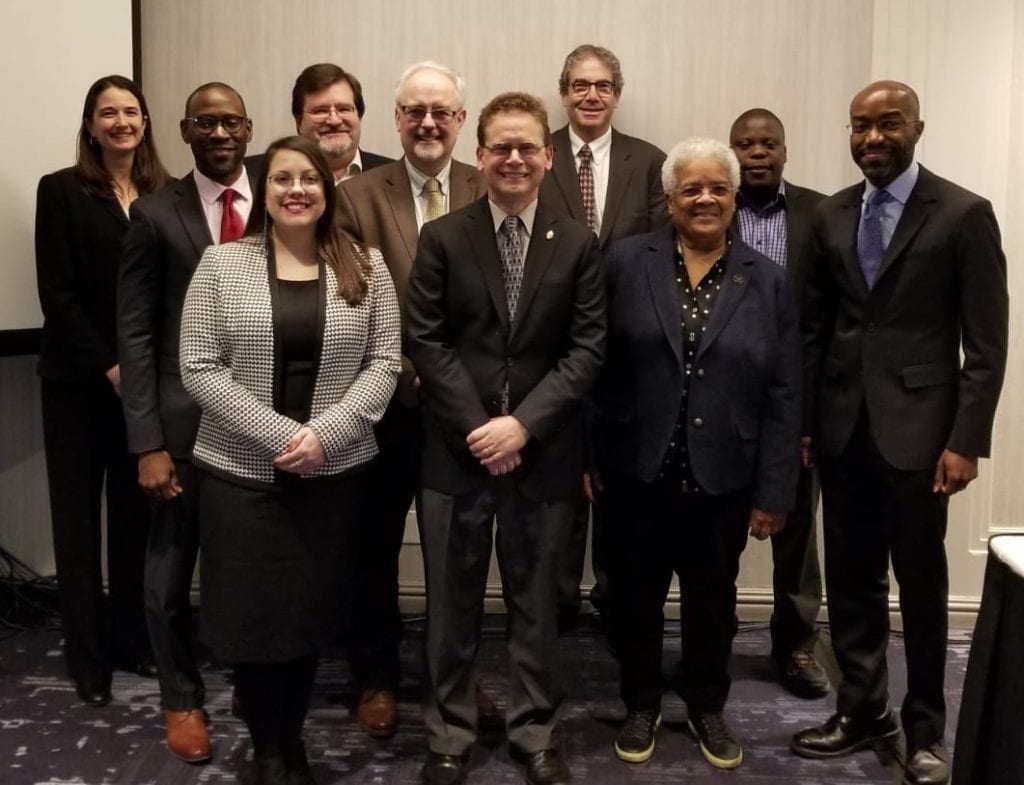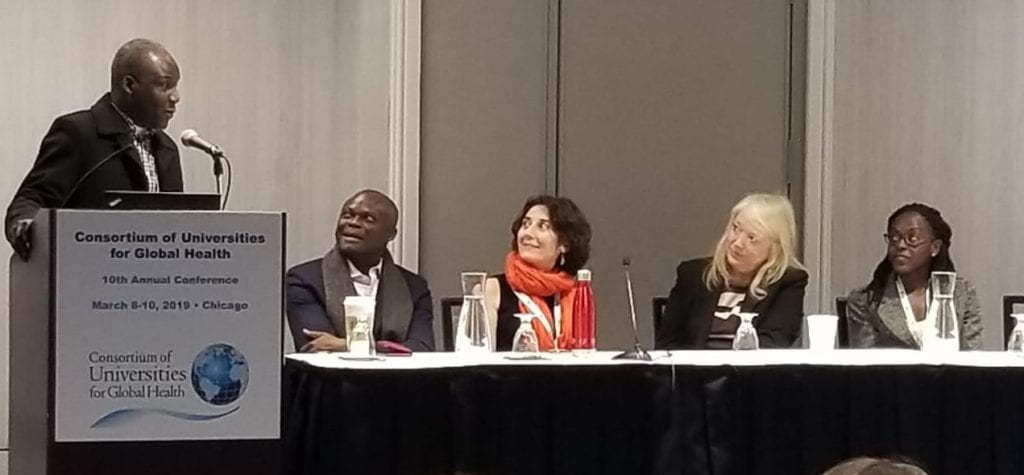Written by Mackenzie Robinson, Global Health Student Advisory Committee member
On March 7, 2019, the Institute of Public Health at Washington University in St. Louis hosted a satellite session on the intersection/commonalities between global health and local (U.S.) health and the struggle for health equity in both fields. The event was divided into two panel sessions: the first was comprised of panelists who spoke on health equity issues that take place domestically in various cities across the country.
The Crisis in our Backyards: Health Disadvantages in the Shadow of U.S. Universities
Dr. Steven Woolf, Virginia Commonwealth University began the session with commentary on his work at the Center on Society and Health, centered on the notion that in order to understand health equities, the key is to look at history and determine the ways in which it affects the health inequities seen today. To illustrate this notion, he gave examples of Richmond, Virginia, including a map that detailed the overlay of the slave trade route on the current map of the city where the direst health outcomes persist, including chronic diseases like diabetes and heart disease. Dr. Woolf outlined 3 levels at which academic institutions can combat health inequities: 1) Address social determinants systematically, 2) help connect patients with various sources of assistance, 3) supporting community initiatives. This proved to be a great set-up for the panel that followed with speakers from St. Louis and Chicago including Jorge Riopedre from Casa de Salud, Dr. Linda Rae Murray from University of Illinois in Chicago, Dr. Steven Wolff from Virginia Commonwealth University, Lindsay Manshack from Washington University in St. Louis, Dr. Tim McBride from Washington University in St. Louis with Dr. Jason Purnell (also from the Brown School) moderating. The panelists reified the importance of Dr. Wolff’s message to look back at history to determine the main causes of the health inequities we see today. “Power is key in all of these health issues as it’s rested in the wrong places. Until this is addressed, nothing will change” said Dr. Murray.

Global Health: Lessons in Pursuit of Health Equity
Dr. Louise Ivers from Harvard Medical School led the next session that illustrated the parallels between the main global health issues of our time, including access to safe, clean water and food insecurity, and the current state of U.S. health across the country. She ended her session with a final message for how to encourage ethical, responsible health equity work with one key message: “Give priority to proximity.” Practitioners and researchers from high income countries need to accept they do not have the answers, and it is instead the ones who are closest to the problem who ultimately know the solution. Then, the panelists were incorporated to discuss how the local issues from the first session tie into global health issues that they have worked on in their careers. The panelists were William Byansi from the Brown School at Washington University in St. Louis, Dr. Rodrigo Reis, from the Brown School, Dr. Andwele Jolly from Washington University School of Medicine, and Dr. Anne Sebert-Kuhlman from Saint Louis University with Dr. Bill Powderly, the Larry J. Shapiro Director of the Institute of Public Health at Washington University in St. Louis moderating. When asked to discuss the commonalities between their global health work what they have seen in the US, Dr. Reis mentioned how in Brazil, the country where he is from and does a lot of his research, access is not so much an issue as quality is, whereas, in the US, it is the opposite. In the US, access is the main barrier and cause of health inequities whereas quality of care is less of an issue compared to Brazil. The panelists also discussed how they have all recognized similar levels of mistrust among local communities surrounding healthcare and research. What changes is to which entities that mistrust is directed towards. As a way to combat this, Dr. Jolly advised to “first, seek out shared experiences between yourself and the community with which you are working. You can then use those experiences to develop trust and work together.” Dr. Powderly’s last question asked how local and global health movements can bridge the gap and unite to fight health inequities everywhere. William Byansi discussed the importance of technology and how it can be used to change lives around the world. “Technology has opened the door and enabled us to learn how to address problems.” Dr. Kuhlman ended by discussing the importance of making these commonalities between global and local known in the classroom (at academic institutions).
Addressing Gaps in Child Behavioral Health Services and Research in Sub-Saharan Africa
Dean Mary McKay, Dr. Fred Ssewamala, and Dr. Ozge Sensoy from Brown School held a panel entitled, “Addressing Gaps in Child Behavioral Health Services and Research in Sub-Saharan Africa” at the Consortium of Universities for Global Health’s (CUGH) 10th annual conference in Chicago. The panel was sponsored by the Institute for Public Health’s Global Health Center.
WashU speakers were joined by their in-country collaborators, Dr. Abdallah Ibrahim from University of Ghana and Ms. Phionah Namatovu from the International Center for Child Health and Development field office in Uganda.
Using the child mental health research undertaken by SMART (Strengthening Mental health And Research Training) Africa Center funded by the National Institute of Mental Health, the objectives of the panel were to: 1) describe the interrelated strategies to ensure the scale-up, uptake, and sustainability of evidence-based practices (EBP) focused on child behavioral health challenges in sub-Saharan Africa; 2) examine the multi-stage collaborative process by which an EBP, namely 4Rs and 2Ss Family Strengthening intervention, has been revised and adapted to optimize fit to local contexts in Uganda and Ghana with intervention fidelity; and 3) present the prevalence rates of behavioral challenges among school-going children, utilizing a school-based sample in southwest Uganda.
The panel was well attended and had a lively Q&A session.
